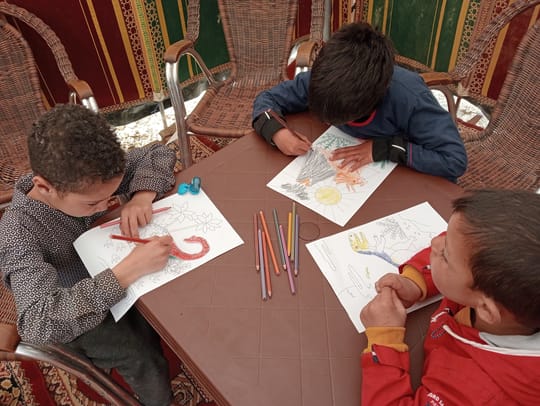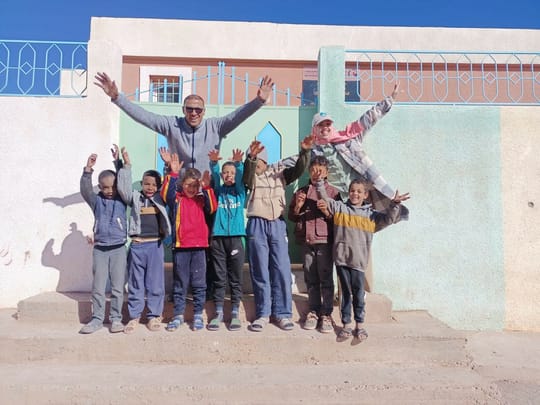From Within: Narratives of Resilience in Ijoukak

On Friday, September 8, 2023, in Tagherghist, the commune of Ijoukak, I was in the midst of my work as a family literacy teacher. After I finished my work, I stayed there overnight. Everything was perfectly fine until 11:12 PM – what happened then was entirely unexpected, particularly in the Atlas Mountains: a sound occurred, one that remains entirely unforgettable, and there was a sudden and rapid shaking of the ground.
We had no idea what was happening, although some said it was the coming of the Day of Reckoning – the end of the world. Eventually, after a few hours, we discovered that it was an earthquake of magnitude 7.2 on the Richter scale. Nobody could have predicted a natural disaster like this would strike the Atlas Mountains and the surrounding areas.
That night was pitch black, full of fear and sorrow. Everyone gathered in one place – men and women, the old, the young, and the children. It was a journey of life or death within moments. A night of consecutive jolting shudders. Everyone was outside of their houses. No electricity, cellular network, or even sleep – only fear filled the place. When the morning came, and when we could see, we couldn’t find the words to describe our feelings.
Houses collapsed, and neighbors, friends, and family members died – indeed, the night of September 8, 2023, left behind tearful stories.
Thank God, everyone mobilized and stood together as one in support of their brothers and sisters. People provided humanitarian aid to meet most of our needs, and the High Atlas Foundation was one of the first to do so. Indeed, special thanks are due to the High Atlas Foundation for its significant contributions towards the distribution of both financial support (such as food supplies, blankets, mattresses, warm clothes, and tents) and psychological and social support to those affected by the earthquake – despite the destruction of all the roads, support was able to reach most of the affected villages.
In cooperation with Project HOPE, the High Atlas Foundation established workshops for empowerment and social and psychological support to benefit the women and children living in the affected areas. The workshops consisted of weekly sessions lasting over one month, and the team comprised two empowerment facilitators, a teacher, and a psychologist.
The aim of the psychological and social support sessions is essentially to help people overcome their shock, pain, and psychological fatigue (even if only slightly) and to help them solve other psychological problems. My own role in the empowerment and social and psychological support team is as a teacher for children at the workshops and our visitations to the affected areas, including Al-Haouz, Marrakech, Chichaoua, Ouarzazate, and Taroudant.
Since the earthquake, every area has had its own sad story.
Amongst the children that I’ve worked with in the psychological and social workshops are children aged 3, 5, 10, and more, discussing and expressing the fact that some had lost their families and others their friends. Some of them even talked about how they saw family members under the rubble or their friends covered in a burial shroud. We have to ask ourselves how a child can endure all of this – shocks and psychological fatigue – at such a young age.
We’ve engaged the children in several activities, such as drawing, coloring, and playing with the younger ones. We do so not only to bring back a sense of fun and joy and to make them happy but also to try to move them from their current state of sadness to an acceptance of their new state of living – to bring them a sense of optimism that there is always goodness to be found.

As for me, although I’ve had the same experiences and been in the same place, I’ve learned, in the context of what happened in the earthquake, that despite all the aches and pains, as long as we are alive with the grace of God, we must rise again, help each other, and believe that there is a better tomorrow and that after hardship, there is ease. Thus, we should concern ourselves with helping those who rely on us, particularly the children – the youth of the future.